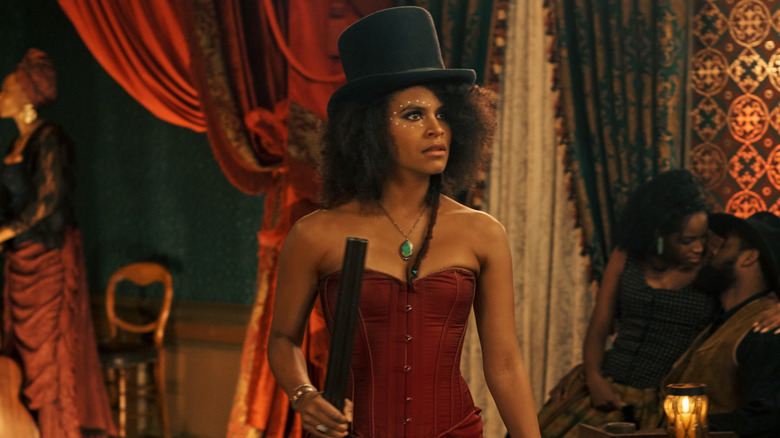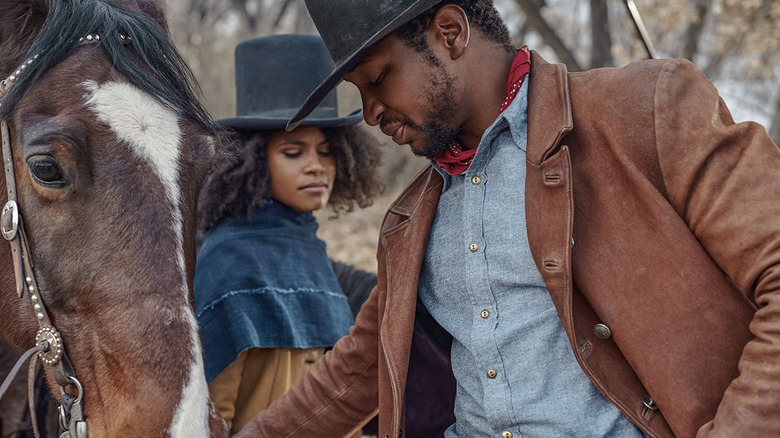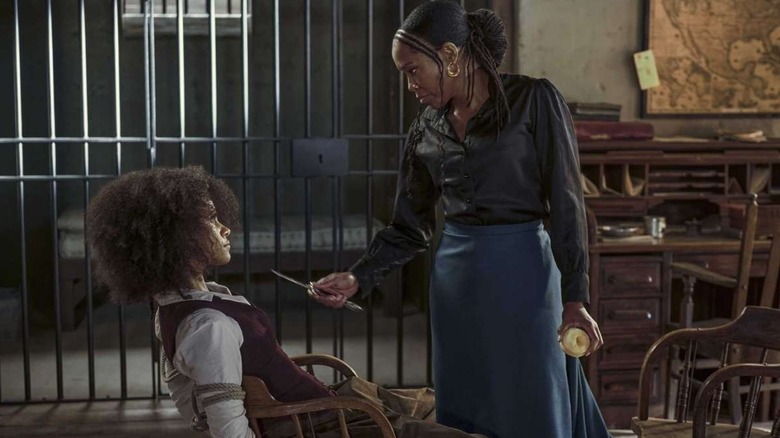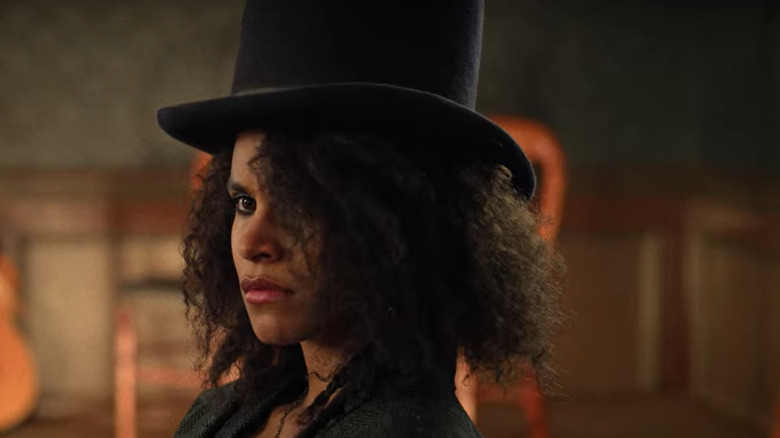Zazie Beetz Took A Crash Course In Westerns While Making The Harder They Fall [Interview]
Zazie Beetz boarded "The Harder They Fall" as the brazen, unflinching Stagecoach Mary. The shot-gun wielding saloon owner volunteers herself for danger when she rejoins Nat Love's (Jonathan Majors) gang to hunt down the man who murdered his parents. Beetz was jazzed at the prospect of the character, a deadly force to be reckoned with and a crucial member of the gang. Plus, "The Harder They Fall" offered the opportunity for the actress to delve into the western genre for a bold reinvention.
"The Harder They Fall" takes all the staples of the Old West and blends them with the new. Playful, stylish and wonderfully musical, the film reframes the historically white genre with an all-black cast. Beetz is among the many performers bringing new life to western storytelling and /Film got to chat with her about the exciting process.
"There's a reason why things are classics."
Were you a big Western fan when you signed on for The Harder They Fall?
If I'm being very honest, not really, no. But it was a great opportunity to honestly get educated on a genre I should know a lot about, because it's a very iconic one in cinema history. And me and Edi Gathegi, who plays Bill Pickett in the film, we would meet up on Sundays and watch a movie together. [Laughs] And so we started, we just watched a bunch of Westerns and that was really cool. There's a reason why things are classics and it's really cool to discover that. And I don't have the nostalgia attachment as a child of like, "I grew up with," whatever, but as an adult to be like, "Oh, this is why the stories were interesting, the acting was interesting." And there were some that were obviously better than others. "Butch Cassidy and the Sundance Kid" is an incredible movie and I'd never watched it before. I should have and I didn't. And so that was really fun to discover.
Yeah, of course! And I know Jeymes is very, very enthusiastic about...
It's his favorite, yeah! That's his favorite. And so it was nice to have his enthusiasm also. To hear his point of view on the genre, as well, as we were reworking it in a way. I like [that] this film was the reimagination of the Spaghetti Western. And it was interesting to see the lack of Black representation in these older films. After learning more about what the demographic of the west actually looked like, it felt so odd to me. Before, I feel like I used to not really question it because it wasn't brought to my attention and then I was like, "Oh yeah, obviously we were there. And there were a lot of us there." And it was cool in this film to really live in that and to own that. And Black towns, all Black towns were a thing. We had communities. We ran businesses. We had our own microcosm. And so that was a really cool thing to explore in making this film.
"It was all of us women figuring out this huge stunt scene."
So your character Mary has this really interesting relationship with Trudy [Regina King] where they kind of have some understanding, but there's also a lot more behind it... Can you talk about that?
Yeah. I like that you bring that up because I feel like we both tried to approach the characters as yes, we are sort of in a loose term kind of enemies, I suppose. But also I think we have great respect for one another and respect each other for what we are known for, have done in the past, sort of in the context of the film. And I think even when we meet each other in the film, I feel like there's this, "Ah, I've heard of you." And I liked the idea of, "I see you for what you've done and what you've accomplished. That doesn't mean I can't eliminate you." But I thought that I liked that element of mine and Trudy's relationship and arc throughout the film.
Right, because when it comes down to it, Mary is like, "She's mine to take," and you get this grand, epic showdown. What was it like prepping and shooting that scene?
Which was super fun. And honestly, by the time we finished shooting that, Regina and I and also our two stunt doubles, we felt very... Like a girl power moment. Because it was all of us women figuring out this huge stunt scene. It took a long time to rehearse and to get right, the choreography. And it took a few days to shoot. And when we finally finished it, we felt really like, "Wow, that was a huge sort of climactic moment for our characters." But then also it was like, we... As women, we figured that out together, did that together. And so that was a cool moment.
How did it compare to other action you've done, like in Deadpool? Or even in "Bullet Train" coming up?
There's that one sort of large hand-to-hand combat scene that Regina and I have, but beyond that, I would say the majority of our training focused on horseback riding and sort of old gun handling, which is different than in "Deadpool" where you're working with sort of more modern renditions of weaponry, I suppose. It was cool to see more of the mechanics of something and to work with sort of old mechanisms and it felt different versus in "Deadpool," there's a large focus on combat. And in this one, the training was really horse and what is your gun trickery and stuff like that. And so it felt a little more technical rather than stamina and bulk in a way. And these people are functioning in the world and running around in the world. And how do you look natural in that versus just looking cool punching? And really getting comfortable with your horse and getting so comfortable that it feels like second nature, with the guns you're using. And so, yeah, I would say in terms of that, it felt different.
"I really liked the idea of Black people not being defined by whiteness."
Mary has this grand, mythic story behind her. How did you balance the historical person that this was and creating a new version of her?
I think the moment I read the script really, Jeymes really led with this idea of they are historical characters being thrown together, and it's a sort of a reel of the best of. And what would happen if they were all in the same time? And realistically, none of them really knew each other. They all were kind of in their prime at different times in history. When I was approached, most of the actors had already been cast. And in terms of age or looks, none of them really resembled the characters in history. And we also, we're all making up our own backstories and stuff, but for me, I was really focused on... I read about Mary Fields, the woman, but I also read about a bunch of stories of people in this time.
And we cherry-picked little things and I think everybody kind of cherry-picked what felt significant to the narrative of the film, which was already established for us and to insert from history what works in this story that was given to us essentially. Even Nat and Mary being in love, they didn't know each other in real life. And Mary, even the stories we know of her really are when she's an older woman, and I'm 30. So it was, I think, playing more with the spirit of the time, the spirit of the people living in this time.
And we really wanted to make sure that the names, we were speaking these names and that we can continue to potentially see more stories made of them and hear of them and have people be like, "Oh, were these real people? Let's look them up. Let's talk about them." And I'm hearing people talk about them more than I ever have in my life, and I've learned about them. I didn't know about them. And so that, I know for Jeymes, is a big thing of, "Let's bring these names into the collective consciousness." And so I hope that is something that the film achieves.
After giving yourself that crash course on Western movies, for you, what does this idea of the New West mean? What does that look like?
I think there's a lot more diversity than we were sort of presented from the Hollywood point of view. I also think that in terms of film and genre, the way Jeymes has approached it, it's how music is involved and the kinds of shots and the kinds of editing around it. A really popular thing to do right now, I think is to play heightened world, heightened space, but sort of a grounded story in a way.
And I feel like this takes on that kind of, I think, trend that's a little bit in film right now. If I think of different popular films or things that I like. And yeah, I think adding sort of modern twists to the traditional structure, I suppose. But I really liked the idea of Black people in this film not being defined by whiteness at all, like the bad guys and a white guy or something like that. But we're just living in our world and we were there and to just really acknowledge that felt powerful to me. And we were there on our own terms, essentially.
"The Harder They Fall" is now playing in theaters, and arrives to Netflix on November 3, 2021.



